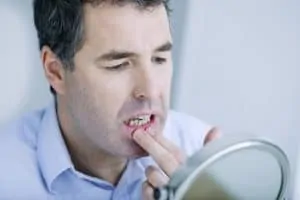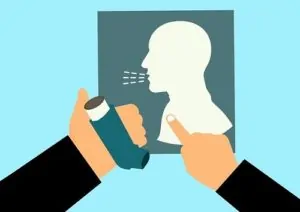Oral Health

Teeth Clenching & Grinding
Our bodies react to stress in interesting ways. Sometimes our gut health is affected. Other times it’s our oral health. During periods of high stress, many people may begin clenching or grinding their teeth, and oftentimes they don’t even know it or they may be doing it subconsciously while sleeping. This repeated movement of teeth against teeth can cause teeth to wear down and appear shorter. It can also cause teeth to crack, break, or chip, requiring treatment from your dentist in Sparks. But even that’s not all. Clenching and grinding your teeth puts unnecessary and unnatural stress on the jaw joint and can cause severe TMJ pain or TMJ disorder.
Gum Disease
Prolonged periods of stress can also increase someone’s risk of developing gum disease. Gum disease is an infection deep under the gum line that requires professional dental treatment. However, if it’s not treated, gum disease can cause other problems throughout the body and put overall health at risk. Gum disease has been linked to an increased risk of heart disease, kidney disease, respiratory disease, and even certain cancers. Besides stress, other things that increase the risk of gum disease include poor dental hygiene, smoking, and seeing your dentist in Sparks every six months for deep cleanings.
How To Decrease Stress
We understand that the current state of the world can easily cause stress levels to spike and put us at risk for both oral health problems and whole-body concerns. But one of the best things you can do during uncertain, stressful times is to learn effective ways to lower stress. Some stress-reduction techniques include:
- Sleeping. Falling and staying asleep can be difficult when we’re stressed out and our minds won’t stop racing. But it’s crucial to your health to get enough sleep every day. Not only can sleeping enough lower stress (and probably make it easier to fall asleep), it can also give your body time to recover and keep you healthy. Try listening to calming sounds, avoiding your phone an hour before going to bed, and keeping a regular sleep schedule.
- Meditating. Mediating has been proven to lower heart rate and help us feel relaxed, thus lowering stress. Find a free app on your phone that will guide you through meditations and teach you how to effectively lower stress by simply breathing. Meditation is like anything else, you need to practice it to get really good at it so be sure to schedule time each day to focus and meditate.
- Exercising. Another proven way to lower stress and boost health is to exercise often. Whether you choose an online spin class, practice yoga, or run or walk, make sure you get a good sweat session daily.
Now and always, it’s important to keep your stress levels low and immune system high to keep yourself healthy. Find a stress-reduction plan that works for you, eat a well-balanced diet, and see your dentist in Sparks every six months.

What are Dentures?
Dentures are a tooth replacement treatment option that has been around for quite some time but has been improved upon as technology advanced. Dentures can either replace all of your natural teeth or even only a series of missing teeth (called a partial denture). They are removable, non-permanent prosthetics that are custom-created to fit in your mouth and appear like natural teeth.
Pros of Dentures
There are several benefits of dentures, including:
- More affordable than dental implants
- Can be good for those who just had their teeth removed and who want time for their mouth to heal before dental implant surgery
- There’s no surgery involved
- Dentures or partial dentures can be modified if more teeth are lost later in life
Cons of Dentures
As with anything, your dentist in Sparks also wants you to be aware that dentures can also come with a few cons such as:
- They may not look as natural as dental implants
- They have to be removed, cleaned, and stored properly every night
- They require adhesive to stay in place which can get costly over time
- They can slip while eating and talking which can be uncomfortable
- They may not allow you to eat all the foods you want to eat such as corn, apples, or things with tiny seeds
- They can increase the likelihood of gum disease if they aren’t cleaned properly or if food gets trapped
- They’re very delicate and can break easily and require a brand new prosthetic
- Partials can weaken the teeth supporting it leading to additional problems
What are Dental Implants?
Like dentures, dental implants can also replace either one missing tooth or an entire mouth of missing teeth. But unlike dentures, dental implants are permanent, and instead of sitting on top of the jaw bone, dental implants are secured into the jaw bone. Dental implant treatment starts with a titanium post being placed into the jaw bone where it will act as your tooth root. As it heals, your bone will actually grow around the post, securely locking it into place. Afterward, an abutment is added to the post, and a brand new crown custom-created by your dentist in Sparks is placed on top. Now, if you’re missing more than one tooth, a few posts may be implanted into your bone then a full set of brand new teeth will be permanently secured to them, giving you a brand new look.
Pros of Dental Implants
Dental implants can be the best and longest lasting tooth replacement for you and can also provide some of the following benefits.
- Dental implants tend to be more comfortable than dentures
- You can eat what you want with dental implants
- They don’t affect speech
- They don’t require daily removal and reinsertion
- You can care for them just like your natural teeth
- Dental implants can last for decades with proper care
- They can reduce the risk of additional oral health problems
Cons of Dental Implants
Even though dental implants may appear to be all positive, there are a few cons as well.
- Dental implants are more expensive than dentures
- They do require surgery
- Not everyone is a candidate for implants
If you’re tired of living your life with missing teeth, call your dentist in Sparks and schedule a consultation. Together, you can find the best way to replace your teeth and begin treatment so you can start smiling fully again.

Cow’s Milk
The tried-and-true milk choice of dentists and many healthcare professionals is good old fashioned cow’s milk and for good reason. Cow’s milk is packed with two of the most important ingredients that our teeth (and our bones!) need to stay strong and healthy. We’re talking about the combination of calcium and vitamin D. This powerful duo is crucial for replenishing minerals in the teeth. You see, tooth enamel weakens when it’s attacked by acids and its otherwise suburb protection is diminished. This leaves teeth at increased risk of infection, decay, and cavities. To help remineralize tooth enamel, we need to supply our bodies with calcium and vitamin D, and as you know, cow’s milk is an excellent source of these two minerals.
Soy Milk
Soy milk, on the other hand, still contains calcium and vitamin D but in significantly lower amounts. But that’s not all. One study found that bacteria commonly found in the mouth produced five to six times more acid when introduced to soy milk as compared to cow’s milk. An increase in acid means an increase in enamel erosion as well as an increase in the risk of decay and cavities. Keep in mind, this was one study and more research is needed to suggest a strong correlation between soy milk and cavities.
A Few Exceptions
While the benefits of cow’s milk can certainly help build strong, healthy teeth and bones, some people can’t drink it due to lactose intolerance. Those who are lactose intolerant have trouble digesting lactose, which is naturally occurring in cow’s milk and other dairy products. Instead of cow’s milk, individuals with lactose intolerance should choose a type of milk that’s easier to digest, such as calcium-fortified coconut or almond milk.
Other exceptions to choose an alternative to cow’s milk may be for religious, moral, or dietary reasons. In all cases, it’s important to your dentist in Sparks that those who can’t drink cow’s milk should supplement their calcium intake with other foods such as nuts, seeds, fish, and vegetables, and to talk with their doctor about whether or not they need a calcium supplement.
As always, even though diet plays an important role in oral health, it’s still incredibly important that you and your family see your Sparks dentist every six months. These dental checkups give your dentist the opportunity to ensure that there aren’t any tiny problems lingering around just waiting to cause a bigger, potentially painful problem, and they give your dental hygienist the chance to thoroughly clean those pearly whites. Plus, it’s always nice to you.
If it’s been longer than six months since your last dental visit, call us to schedule an appointment today!

Risks Associated with Dry Mouth
The truth is, living with a dry mouth day in and day out isn’t only uncomfortable, it can be bad for your overall oral health, too. You see, when the mouth feels dry it means that your saliva glands aren’t producing enough spit to keep your mouth lubricated and moist. A healthy mouth is constantly producing saliva which helps neutralize plaque acids, rinse away bad bacteria that could cause decay, and remove leftover food particles. However, when someone is experiencing dry mouth, there’s not enough saliva to perform those jobs properly. In turn, this increases the likelihood of having bad breath, developing cavities, and other serious oral health problems that require treatment from your Sparks dentist.
What Causes Dry Mouth?
There are several possible explanations for an individual’s dry mouth. For example, if you’re only experiencing dry mouth for a short period of time, it may simply indicate dehydration. Drinking more water throughout the day can make a big difference. On the other hand, there are times when dry mouth seems as if it’s never going to go away. If this happens, you may need to talk with your dentist in Sparks about what may be causing it. Some common causes of chronic dry mouth include:
- Medications. If you read the label or insert that accompanies your medications, you shouldn’t be surprised to see dry mouth listed as a common side effect. Tons of medications can contribute to dry mouth. Anything from anxiety and blood pressure medicines to cancer treatment can cause dry mouth, so it’s important to read those warning labels and inserts. If your medication may be to blame for your dry mouth, don’t stop it without talking to your doctor first. You should also ask your dentist about some ways you can combat dry mouth that’s caused by medication.
- Diseases & Other Health Problems. If you have other health problems or certain diseases, you may be at increased risk for dry mouth, too. Some diseases that are known to cause dry mouth include, but are not limited to, Sjögren’s syndrome, HIV/AIDS, and diabetes.
- Tobacco & Alcohol. Smoking, using smokeless tobacco, and drinking alcohol all naturally have a drying effect on the mouth. Since these are often regular habits that people engage in often, the mouth is constantly being dried out. The best way to stop dry mouth caused by tobacco or alcohol is to quit or, at a minimum, cut back.
- Mouth Breathing. We’ve all had to breathe out of our mouths during a wicked cold or during allergy season when the nose is too stuffed up to allow air through. But some people naturally breathe out of their mouths instead of their noses, especially during sleep. However, when the mouth is opened for prolonged periods of time and the inside is constantly exposed to air dries, the result is an uncomfortably dry mouth.
Signs & Symptoms
Most sufferers of dry mouth know they have dry mouth simply by the feeling alone. However, some other common symptoms of dry mouth include:
- Cracked, dry lips
- Difficulty swallowing, chewing, or speaking
- Dry throat or tongue
- Bad breath
The good news is dry mouth can often be treated successfully with intervention from your dentist in Sparks. There are also things you can do at home to lower your risk of dry mouth such as:
- Drinking plenty of water throughout the day
- Limiting your intake of caffeinated or alcoholic beverages
- Chewing sugarless gum to stimulate salivary glands
You don’t have to live with a dry mouth. If you’re ready to talk about how we can help, give us a call today to schedule an appointment.
We’re heading into the dog days of summer, which typically means really hot days and a lot of sunshine. This can be great for enjoying some time in the pool, on the lake, or at the beach, but your dentist in Sparks wants you to know that all of this sun can also be great for your oral and overall health thanks to the extra boost of vitamin D.
The Power of Vitamin D
The sun is a pretty powerful thing — it helps us grow food, it keeps us warm, and it prevents the planet from turning into a giant ice ball. But the sun’s benefits run even deeper. In fact, we have the sun to thank for helping our bodies stay happy and healthy thanks to a little thing called vitamin D. Vitamin D is an essential vitamin that helps our overall and oral health in so many ways, such as:
- Calcium Absorption – We all know that calcium is needed to help build strong bones and teeth. But your dentist in Sparks also knows that without vitamin D, the benefits of calcium don’t go as far. Calcium needs vitamin D in order to absorb properly and completely, and in order for your body to get all of the benefits of calcium.
- Protection Against Tooth Decay – Similarly to the above, several studies also suggest a positive correlation between vitamin D and the prevention of tooth decay. Researchers have even shown that vitamin D can lower the risk of tooth decay by 50%!
- Immune System Support – Vitamin D can also help support the immune system and help it function properly. While this connection is complex, there is proof that vitamin D helps regulate and balance the immune system to protect us from germs, viruses, and infections.
The best way to get vitamin D is through some good old fashioned sunshine. But as we all know, too much sun can have negative effects, such as a painful sunburn and an increased risk for skin cancer. Enjoy sunlight in moderation and know your limits. Most researchers agree that anywhere between 5 and 30 minutes of sunshine a day is all it takes to get enough vitamin D.
Good Sources of Vitamin D
Getting enough vitamin D can be difficult, especially during winter months or over several days of dreary, rainy weather. When the sun isn’t an option, you can get your vitamin D by choosing foods that contain it. Some foods that are good sources of vitamin D are:
- Fatty fish such as salmon or tuna
- Eggs
- Milk
- Fortified cereal, orange juice, or yogurt
Knowing all of the benefits associated with sunshine and vitamin D, trust your dentist in Sparks when they say to get outside, enjoy the weather, and soak up some rays. Just make sure you limit your exposure to direct sunlight and wear sunscreen if you’ll be outside for an extended period of time.

Know The Risks
Like any type of piercing, a tongue or lip piercing requires your body to undergo minor trauma as well as introduces a foreign, metal object into your body. As a result, there are a few risks associated with an oral piercing such as:
- Infection. One of the most common side effects of piercings is infection. While infection can happen with any type of piercing, oral piercings may be more susceptible thanks to the ideal warm and moist environment the mouth provides, along with the fact that the mouth is already home to tons of bacteria. This type of environment is the perfect place for the bacteria to flourish and cause an infection. While these infections can be minor, there is a chance of a serious, life-threatening infection, too. Some infections may cause the tongue to swell, making it difficult to breathe.
- Tooth & Nerve Damage. You’ve probably noticed that those with a pierced tongue or lip tend to play with the piercing a lot. This constant clicking and clanking of metal against teeth increase the likelihood of tooth damage – such as chipped teeth, broken teeth, and worn enamel – which can expose teeth to bacteria and decay. Damage to teeth will need to be fixed by your dentist in Sparks before it leads to bigger and potentially painful problems. But that’s not all. There’s also the risk of nerve damage. Our tongues are home to a lot of nerves, and if the piercing needle hits one at the wrong angle, you may experience temporary or sometimes permanent numbness. This nerve damage can also affect your sense of taste and how you speak.
- Gum Disease. Teeth and nerves aren’t the only things that can be damaged by tongue or lip piercings. Gum tissue is also at risk for damage caused by a lip or tongue ring. While that may sound like a minor inconvenience, the truth is that once gum tissue is damaged, it makes it incredibly easy for mouth bacteria to work their way up under the gums and settle in, resulting in gum disease. Gum disease is a serious concern for your dentist in Sparks as it can lead to chronic bad breath, tooth loss, and even whole-body health concerns such as heart disease.
Protect Yourself
We’re not here to tell you that you can’t get a tongue or lip piercing, but we do encourage you to take the necessary steps to protect yourself against the risks above. Some things you can do include:
- Pick a professional piercer with a good track record and high sterilization standards. If they can’t answer your questions about safety and sanitation, choose someone else.
- After you get the piercing, clean it well and clean it often to help minimize your risk of infection.
- Rinse your mouth out with water after you eat to help wash away any food particles that may have gotten stuck in your piercing.
- Avoid playing with your piercing to minimize the chance of tooth and gum damage.
- Oral hygiene is even more important for those with an oral piercing so make sure you maintain great oral hygiene at home and see your dentist in Sparks every six months.
Most importantly, know the signs of infection and seek medical care immediately if you notice swelling, redness, fever, chills, or uncontrollable shaking.
If you have any questions or concerns about oral piercings, talk with your dentist.

Gum Disease
One of the most common signs of gum disease is painful, swollen, red gums. You may experience increased pain when brushing or flossing your teeth, and you may also notice that your gums bleed during those activities. Gum disease is a serious oral health condition that doesn’t happen suddenly but rather over time and often due to poor oral hygiene. If left untreated, gum disease can lead a whole host of both oral and overall health concerns such as tooth loss, heart disease, kidney disease, and even some cancers. However, if caught early, gum disease can be treated successfully. This is one reason why seeing your dentist in Sparks every six months is so important.
Oral Cancer
Another possible explanation for gum pain can be oral cancer. Even though oral cancer can affect the tongue, cheeks, throat, or the gums, it’s important to talk with your dentist in Sparks about any changes in your mouth, especially if they cause pain or are accompanied by a sore that doesn’t go away. Oral cancer usually presents itself as a sore, but it doesn’t necessarily have to feel sore, too, so make sure to monitor any abnormalities and report to your dentist sooner rather than later if they don’t go away. Oral cancer can be treated successfully, but the earlier it’s caught, the more successful treatment tends to be.
Canker Sores
Speaking of sores in the mouth, canker sores are incredibly common and usually no cause for concern. However, they can cause gum pain. There’s no magic treatment to making a canker sore go away, and they will usually disappear on their own. But again, if what started out as what you thought was only a canker sore doesn’t get better on its own, a visit to a dentist in Sparks should be the next step.
Hormones
Now, this explanation behind gum pain only applies to women, but it’s certainly worth mentioning. During different times in a woman’s life, she goes through hormonal changes, especially during menstruation or pregnancy. One area that can be affected by these shifts in hormone level is the gums. It’s common for women to experience swollen or bleeding gums during both pregnancy and a few days before their periods. The pain is usually temporary but you should still discuss it with your dentist.
If you’re experiencing any gum pain, it’s important to call and schedule an appointment with your dentist in Sparks. The pain may be minor and nothing that requires treatment, however, it’s better to get it checked out so that any potential problems are caught early and treatment can begin before the problem gets bigger.

How to Differentiate Between a Headache and Migraine
Oftentimes, the terms headache and migraine are used interchangeably. However, they are technically two separate conditions and present themselves with similar, yet different, symptoms. Both conditions involve pain in the head and it can either be a throbbing or dull pain in both. But there are a few differences in other symptoms that can help identify whether you have a headache or a migraine.
Headache Symptoms
- Pain is usually spread throughout the head
- Pain remains consistent and doesn’t tend to worsen with activity
- Usually has the feeling of constant pressure
- Symptoms are localized to only the head
Migraine Symptoms
- Pain usually affects one side of the head more than the other, but not always
- Sensitivity to light and noise
- Blurry vision
- Nausea
- Aura symptoms such as blind spots, zig-zag lines, or shimmery, glowy patches
Are Migraines and Headaches Related to Dentistry?
We know that it may seem odd to have your dentist in Sparks talk about conditions that seemingly only affect the head, but the truth is, there may be a connection between chronic headaches and migraines and dentistry. After all, the head is connected to the neck which is connected to the jaw, and there are muscle groups connected to each, so it’s certainly worth a closer look.
Numerous studies have shown a potential correlation between a poor bite as well as habitually grinding or clenching teeth and an increased risk of chronic headaches or migraines. When someone has a poor bite or constantly grinds their teeth together, the muscles in the jaw joint are under constant and abnormal pressure and may cause a painful condition known as TMD (or TMJ). But the pain may not end at the jaw joint alone. As we’ve mentioned earlier, the head, neck, and jaw are all connected through a complex system of muscles, so when pain affects one section, it can also spread to affect other areas, such as the head. The theory researchers are studying regularly is that this constant muscular pressure may just cause certain headaches or migraines.
We always encourage migraine and headache sufferers to talk with their primary care physician, as well as their dentist in Sparks, to see if their pain may be caused, or a least exacerbated by, something related to their oral health. Additionally, there is no concrete cause of migraines or headaches, so intervention from your medical team is necessary to diagnose just what may be causing your individual migraines or headaches in order to determine how to treat them effectively.
Re-posted with the permission of Perio Protect.
With the outbreak of the coronavirus, treatment for inflammation and prevention of infection and disease is more important than ever. The human body can only handle so much inflammation, and the healthier a person is – the less chronic inflammation taxing the body – the easier it is to fight off other infections, including viral. This is why we take any infectious oral conditions, even asymptomatic gum disease, so seriously. Brushing, flossing and homecare may seem mundane, but so is washing your hands. These “mundane” acts can help keep you healthy.
Our office prescribes Perio Protect, a homecare system to prevent and treat gum disease. Special prescription trays, called Perio Trays®, are made just for your mouth to deliver medication deep below the gums to fight infections causing disease. The primary medication applied with the trays, Perio Gel® with 1.7% hydrogen peroxide, is highly effective at killing infectious bacteria and reducing inflammation.
Peroxide also kills the coronavirus. Using peroxide in these special prescription trays will not prevent you from contracting the virus, but the peroxide therapy, rinsing with peroxide or brushing with the peroxide gel may help reduce the viral load in saliva and the risk of oral transmission. For this reason, dentists may ask you to pretreat with a peroxide product before coming to the dental office.
Maintain A Healthy Smile and a Healthier Immune System
It has never been more important to keep your gums healthy. Gum health is key to keeping your teeth for a lifetime and important for a healthy immune system. The chronic inflammation from infected gums is also associated with arterial inflammation, heart disease, stroke, dementia and uncontrolled diabetes. For patients with these illnesses, it is especially important to see our dental team.
If you have been told that you have gum disease or if you are concerned about bleeding gums or chronic bad breath, both symptoms of infected gums, be sure to schedule an appointment. We believe that informed patients will make informed decisions. Be sure to contact us to discuss your concerns.

What’s Dentistry Got To Do With It?
Asthma affects 1 in every 13 Americans, or close to 25 million people just in our part of the world. This life-long condition affects the respiratory system and can cause shortness of breath, wheezing, coughing, and chest tightness. It’s a very serious condition that can be treated, but if it’s not treated properly or quickly enough, it can lead to death. So how exactly does this relate to dentistry?
- Mouth Breathing
People with asthma tend to have a hard time breathing and feel as if they can’t get enough oxygen with each breath. Because of this, many asthma patients will breathe out of their mouths instead of their noses, since they can get more air into the lungs this way. However, your dentist in Sparks wants you to know that mouth breathing doesn’t come without risks. Mouth breathing can reduce saliva amounts, as well as the body’s ability to produce more saliva, resulting in dry mouth. Dry mouth is an oral health condition that may seem like only a minor, uncomfortable nuisance, but the truth is dry mouth can increase the risk of decay, cavities, bad breath, and gum disease. Usually, saliva will rinse away bacteria and neutralize acids in the mouth, protecting teeth against their damaging effects. However, when a mouth is too dry to do this, bacteria and acids can attack teeth, resulting in decay. Additionally, when bacteria are left to linger around, it can lead to bad breath.
- Asthma Treatments
Similar to mouth breathing, many asthma treatments, such as inhalers, also cause dry mouth. As we know, a dry mouth is a perfect environment for bacteria and acids to cause damage. If patients do notice a dry mouth after taking their medication, they should talk with their doctor and dentist in Sparks to find ways to relieve dry mouth. Never stop taking a medication without first consulting with your physician.
What You Can Do
There is some good news for asthma patients who are dealing with dry mouth as a result of either medication or mouth breathing. There are things you can do decrease your risk of oral health problems such as:
- Staying Hydrated. Water is one of the most important things for everyone, whether they’re an asthma patient or not. Drinking enough water throughout the day helps keep the mouth moist and helps to wash away bacteria and food particles as well as neutralize damaging acids.
- Rinsing With Water. A quick rinse of water after taking asthma medication will help get rid of any ingredients that contribute to dry mouth so they aren’t left lingering around all day. The more remnants of medication you can remove, the lower the chance of dry mouth.
- Talking to Your Dentist. Your dentist is a part of your healthcare team and needs to know about any health conditions you have, including asthma. Knowing your health history helps your dental team customize treatment for you and notifies them to be on the lookout for any oral health concerns that may result from other health problems in the rest of the body.
As always, the best ways to protect oral health against decay, bad breath, and gum disease are to brush and floss every day and to see your dentist in Sparks every six months for checkups and professional cleanings, whether you’re an asthma patient or not.
